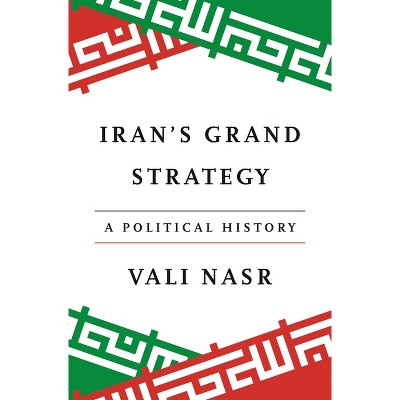Sponsored

How Sanctions Work - by Narges Bajoghli & Vali Nasr & Djavad Salehi-Isfahani & Ali Vaez (Paperback)
In Stock
Sponsored
About this item
Highlights
- Sanctions have enormous consequences.
- About the Author: Narges Bajoghli is an anthropologist and Assistant Professor of Middle East Studies at the Johns Hopkins SAIS.
- 212 Pages
- Political Science, International Relations
Description
About the Book
"Sanctions have enormous consequences. Especially when imposed by a country with the economic influence of the United States, sanctions induce clear shockwaves in both the economy and political culture of the targeted state, and in the everyday lives of citizens. But do economic sanctions induce the behavioral changes intended? Do sanctions work in the way they should ? To answer these questions, the authors of How Sanctions Work highlight Iran, the most sanctioned country in the world. Comprehensive sanctions are meant to induce uprisings or pressures to change the behavior of the ruling establishment, or to weaken its hold on power. But, after four decades, the case of Iran shows the opposite to be true: sanctions strengthened the Iranian state, impoverished its population, increased state repression, and escalated Iran's military posture toward the U.S. and its allies in the region. Instead of offering an 'alternative to war,' sanctions have become a cause of war. Consequently, this book reveals how necessary it is to understand how sanctions really work"Book Synopsis
Sanctions have enormous consequences. Especially when imposed by a country with the economic influence of the United States, sanctions induce clear shockwaves in both the economy and political culture of the targeted state, and in the everyday lives of citizens. But do economic sanctions induce the behavioral changes intended? Do sanctions work in the way they should?
To answer these questions, the authors of How Sanctions Work highlight Iran, the most sanctioned country in the world. Comprehensive sanctions are meant to induce uprisings or pressures to change the behavior of the ruling establishment, or to weaken its hold on power. But, after four decades, the case of Iran shows the opposite to be true: sanctions strengthened the Iranian state, impoverished its population, increased state repression, and escalated Iran's military posture toward the U.S. and its allies in the region. Instead of offering an 'alternative to war, ' sanctions have become a cause of war. Consequently, How Sanctions Work reveals how necessary it is to understand how sanctions really work.
Review Quotes
"A masterpiece. This book is a powerful, humane indictment of forty years of failed US sanctions policy regarding Iran. The damage sanctions have caused to those sections of Iranian society that we in the West want to promote is heartbreaking. This book deserves a wide audience."--Anand Toprani, author of Oil and the Great Powers: Britain and Germany, 1914 to 1945
"A vital study of the most tragic case in the recent history of economic sanctions. Bajoghli, Nasr, Salehi-Isfahani, and Vaez powerfully demonstrate how large the gap between the severe material effects and the limited political efficacy of sanctions against Iran has grown."--Nicholas Mulder, author of The Economic Weapon: The Rise of Sanctions as a Tool of Modern War
"An indispensable book on sanctions' impacts in Iran, How Sanctions Work, opens a window into the fraught, little-understood, but ubiquitous and hugely consequential practice that seems to have supplanted diplomacy in current foreign policy and international relations. This volume shifts our understandings of what sanctions do--in Iran and beyond."--Arzoo Osanloo, author of Forgiveness Work: Mercy, Law, and Victims' Rights in Iran
"Economic sanctions are often viewed as preferable to war as a way to alter the strategic decisions of actors who violate international norms. Yet as the authors of this provocative critique suggest, sanctions can often be equally devastating."--Lisa Anderson, Foreign Affairs
"For the analysts in Washington and Tehran newly evaluating sanctions and their effects, How Sanctions Work is a valuable resource. By centering the targeted country in the discussion of sanctions efficacy, Bajoghli, Nasr, Salehi-Isfahani, and Vaez demonstrate what a case study on sanctions should look like."--Esfandyar Batmanghelidj, Responsible Statecraft
"In the recent How Sanctions Work: Iran and the Impact of Economic Warfare, authors Vali Nasr, Narges Bajoghli, Djavad Salehi-Isfahani, and Ali Vaez present a detailed study on the long-term impacts of economic sanctions on Iran.... The authors demonstrate that decades of Western sanctions, including the Trump administration's 'maximum pressure' campaign of 2018, have neither modified Iran's international behavior in ways intended by policy makers nor precipitated any semblance of regime change."--Steve H. Hanke, Reason
"It is these stories of ordinary people that may humanize a population that has been forgotten to the political rhetoric of states. Far from an obscure political policy, which is intentionally wrapped in complicated legal language to make the issue seem too complicated for the average person to comprehend, sanctions are a form of warfare that is becoming more crucial to discuss and understand. With its far-reaching yet accessible study, How Sanctions Work is a timely and much-needed contribution to that discussion."--Assal Rad, Inkstick
"The costs and consequences of the financial penalties that have been layered onto Iran are the subject of How Sanctions Work.... The authors cover all this in a succinct and accessible manner."--Ray Takeyh, Survival
"There is no shortage of publications on the Iran sanctions, but it is rare to see such detailed, serious work on this topic by highly knowledgeable scholars. How Sanctions Work introduces a wealth of information and perspectives not generally found in the existing Western academic literature."--Joy Gordon, author of Invisible War: The United States and the Iraq Sanctions
"We live in an age where sanctions have become an instinctive reaction by US policymakers (and to a lesser extent also European leaders) when feeling challenged by rival nations. How Sanctions Work represents a smart call to rethink some taken-for-granted assumptions about the power and effects of what historian Nicholas Mulder would call 'the economic weapon.'"--Marc Martorell Junyent, Manara Magazine
"How Sanctions Work is an important study... with findings likely applicable to other countries marked by coercive sanctions, securitized state responses, and interstate rivalries."--Zep Kalb, Phenomenal World
"[How Sanctions Work] presents a new approach to understanding sanctions by highlighting Iranian narratives and the effect of economic hardships on their everyday lives."--Zeinab Nikookar, British Journal of Middle Eastern Studies
About the Author
Narges Bajoghli is an anthropologist and Assistant Professor of Middle East Studies at the Johns Hopkins SAIS. Vali Nasr is Professor of International Affairs and Middle East Studies at the Johns Hopkins SAIS. Djavad Salehi-Isfahani is Professor of Economics at Virginia Tech. Ali Vaez is the Director of the International Crisis Group Iran Project.











